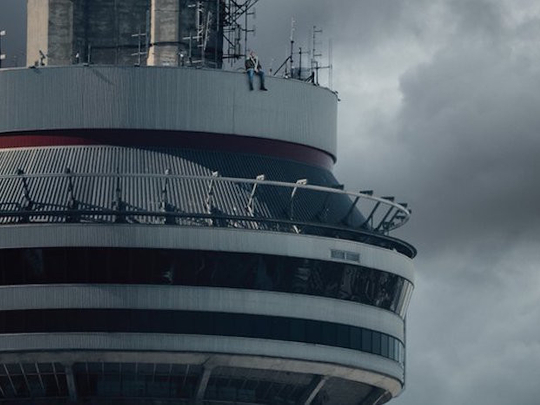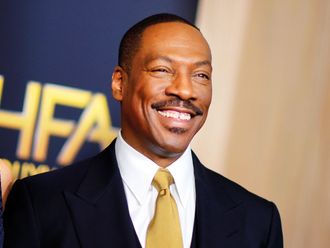
Drake’s career has been built on collapsing walls, and One Dance, one of the early singles from his new album, Views, is a vivacious fulfilment of his promise as hip-hop’s great syncretic hope.
Rapped and sung, sprinkled with patois, made in collaboration with the Nigerian Afrobeats star Wizkid, and sampling from Kyla’s Do You Mind (a smash on Britain’s funky dance music scene in the late 2000s), One Dance is a transnational dance-floor lullaby, one of Drake’s breeziest and most accessible songs, and also one of his savviest.
But One Dance, gentle as it is, is also about fear. “Streets not safe/but I never run away,” he sings, in a dulcet voice.
“I pray to make it back in one piece/I pray, I pray/that’s why I need one dance,” he continues, connecting his urge to live with his urge to move.
It is perhaps the purest distillation of the current state of Drake: globally ambitious, ruthlessly effective, sceptical and wary. A pop star with rap star anxieties. An emperor wondering about the state of his clothes.
Views — Drake’s fourth solo album, not counting umpteen mixtapes and other ephemera — finds him a conqueror between territories: fending off attacks from below, maintaining his grip on turf he controls and wondering what might be next.
Crucially, it’s not the acidic Drake that’s taken centre stage in the last year and a half, on the mixtape If You’re Reading This It’s Too Late and his collaborative album with Future, What a Time to Be Alive. Those releases showed Drake at his most indignant, a left-field turn from the emotional music he’d built his reputation on.
Views shows how Drake’s original sound has become a genre unto itself — not just as a template for others but also for Drake himself. The framework pioneered by him and his right-hand producer, 40 — tender, lush, soothing melodies about romantic vulnerability — can be used for songs about heartbreak, but also for songs about competitive stress, mistrust and fear.
Not that he’s abandoned one-sided relationship talks. The most vivid one here is the fretful and class-concerned Childs Play: You wildin’, you super childish, you go to CVS for Kotex in my Bugatti, I took the key and tried to hide it so you can’t drive it, and put on mileage. Then you find it, awkward silence
On U With Me?, which recalls his excellent Paris Morton Music 2, Drake looks for love on his phone: “I group DM my exes/I tell ‘em they belong to me, that goes on for forever”; “three dots, you thinking of a reaction still.”
But love is, increasingly, about money, too. “Sell my secrets and get top dollar/Sell my secrets for a Range Rover,” he says on Redemption, then continues: “Who’s gonna save me when I need saving?/Since ‘Take Care,’ I’ve been caretaking.”
Drake is more preoccupied with cadence than most rappers, and of course, more able to make unexpected juxtapositions between rapping and singing than anyone else. And thanks to his flirtations with dance hall, Afrobeats and grime, he is as flexible as ever. That’s why the most exciting moments on Views may be structural: Drake rapping in gnawed-off chunks like 2 Chainz on Hype, or with streamlined Jamaican inflections on Controlla, or with the dead-eyed stomp of Chicago drill music on Pop Style.
Views is dauntingly long, and Drake still hears his inner narrative as biblical epic — take the album’s opener, Keep the Family Close, where he sings with resignation and pomp, “All of my let’s-just-be-friends are friends I don’t have anymore/How do you not check on me when things go wrong?” He typically ends his albums with what could be termed a talk track, an extended rumination on the state of his feelings. On Views, there are several such songs sprinkled throughout the album.
But there are risks to effectively becoming your own genre — understudies and comers will do what they can to follow what you’ve already done, but so will you. Overall, Views contains Drake’s most straightforward lyrics, and his emotional excavations aren’t as striking as they were a few years ago, when they had the sting of the new to them.
More isolation
Drake is becoming more walled off as a person, too. He uses social media brilliantly, but not revealingly. He has largely forsworn the news media. Last year, reference demo tracks for a handful of his songs recorded by Quentin Miller, a frequent collaborator, leaked online, suggesting Drake may not have written his own songs, but Drake barely addressed the controversy. When rapper Meek Mill publicly accused Drake of false advertising, Drake replied with great songs, not an outburst.
Given the intensity of that controversy, it’s notable that, as of this writing, Drake hasn’t released the songwriting credits for Views. There was even a transparency hiccup during the album’s release. Drake’s producer 40 posted a list of the album producers on his Instagram, then posted an update including names of producers he overlooked in the first post.
The only public interview Drake has done for Views came on Thursday night, when he sat for a brief chat with Beats 1 radio host Zane Lowe. Despite the controlled setting — an employee of Apple Music speaking with one of the company’s biggest celebrity partners — there was honesty that couldn’t help but peek through: the way Drake began swallowing words when tiptoeing around why the original version of “Pop Style” that included Kanye West and Jay Z didn’t make the album, or gritting his teeth replies when discussing his occasionally frosty history with the Weeknd, a one-time collaborator.
Most vivid, though, there was the heavy muscle and heavier patois he employed when talking about younger Toronto artists following in his footsteps while taking shots at him — “coming for the don,” he called it. If Drake was betraying even a hint of vulnerability or frustration on those other topics, here he was bulked up and on message.
For the last seven years, Drake has recentered hip hop around melody and feeling; turned his hometown Toronto into an aesthetic hotbed; and become one of pop music’s most transformational, and doubted, figures. But all that has come with a price: the realisation that the only way to protect your heart is with armour.











